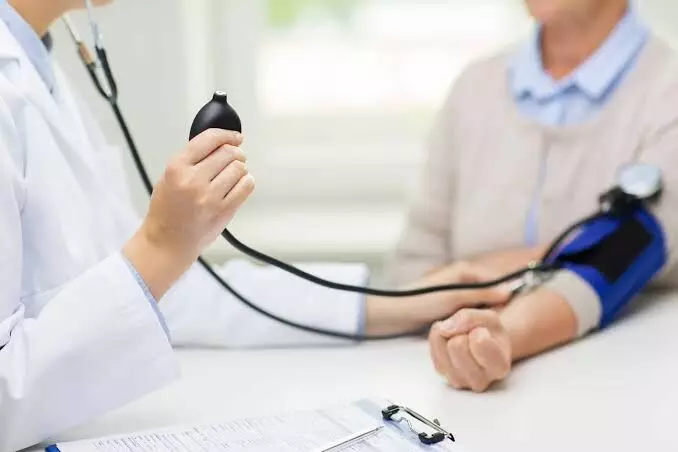World Hypertension Day: Lifestyle changes, continuous monitoring key to overcoming silent killer
Hypertension usually presents without symptoms but can lead to severe health issues if left uncontrolled, and hence requires frequent monitoring
By Neelambaran A
Representational Image
Hyderabad: The first-ever global report of the World Health Organization (WHO), released in 2019, has revealed disturbing figures.
In 29 years, the number of people with hypertension doubled from 650 million in 1990 to 1.3 billion in 2019.
As per the WHO report, only 54% of the adults were diagnosed, only 42% were treated, and just 21% effectively controlled their hypertension, making it a serious global health concern. The figures in the South Aast asian region, including India, are alarming, with around 188 million adults affected by high blood pressure.
Given the scenario, the 20th annual world hypertension day is observed on May 17, with the theme, ‘Measure Your Blood Pressure Accurately, Control It, Live Longer’. The theme emphasises the need for awareness, control and a healthier life.
As per a study held during 2019-21 on 1.7 million respondents, 28.1% had hypertension, of whom 36.9% received a diagnosis, and only 8.5% with hypertension managed to control their hypertension.
Understanding Hypertension: A Silent Threat to Health
Hypertension, commonly known as high blood pressure, is a chronic medical condition where the force of the blood against the artery walls is consistently too high.
“A normal blood pressure reading is around 120/80 mmHg. When readings are persistently above 130/80 mmHg, it is considered hypertension. Often called the ‘silent killer’, it usually presents without symptoms but can lead to severe health issues if left uncontrolled”, said Dr. Shraddha Sanghani, Consultant Internal Medicine, Renova Century Hospitals, Hyderabad.
Common symptoms
Hypertension usually presents without symptoms but can lead to severe health issues if left uncontrolled, and hence requires frequent monitoring.
“In some cases, when blood pressure is very high, individuals may experience symptoms such as headaches, dizziness, blurred vision, chest pain, shortness of breath, fatigue, or nosebleeds,” Dr. Shraddha said.
Most of these symptoms occur only when hypertension reaches a severe or life-threatening stage, so early detection through regular check-ups is crucial.
Types of hypertension
There are two types of hypertension: Primary or essential hypertension and secondary hypertension. Primary hypertension is the most common type and develops gradually over time without a specific identifiable cause and is linked to genetics, aging, and unhealthy lifestyle habits.
“Secondary hypertension occurs due to an underlying condition such as kidney disease, thyroid disorders, adrenal gland problems, or due to the use of certain medications like oral contraceptives or decongestants. It usually appears suddenly and may cause higher blood pressure than primary hypertension. Hence, when an individual develops hypertension early in life, the evaluation for secondary causes is also required”, Dr. Shraddha added.
Complications of uncontrolled hypertension
Lack of awareness and poor dietary practices lead to uncontrolled hypertension, resulting in life-threatening conditions.
“When individuals fail to control their hypertension, they may suffer from a heart attack and heart failure due to the added strain on the heart, stroke due to rupture or blockage of arteries in the brain, kidney damage, vision loss or cognitive decline, and dementia”, Dr. Shraddha noted.
Managing and controlling hypertension
The experts suggest non pharmacological measures including regular monitoring of blood pressure and routine check-ups, reduced salt intake, increasing intake of fruits, vegetables, whole grains, and low-fat dairy, physical activity and maintaining healthy weight to control hypertension.
Dr. Shraddha explained the need for medication for individuals whose blood pressure is not controlled by lifestyle changes alone.
“Medications play a vital role in bringing blood pressure within the target range and preventing complications. It is important to take prescribed medications consistently and not stop them even if one feels fine. Proper adherence to treatment improves overall quality of life”, she said.
Dietary Approaches to Stop Hypertension (DASH) diet, staying active, avoiding excessive salt and processed foods, and managing stress early in life can reduce the risk of developing high blood pressure.
“Early awareness, medication adherence, and consistent lifestyle changes can go a long way in preventing and managing hypertension, ultimately protecting against its long-term complications”, Dr Shraddha insisted.